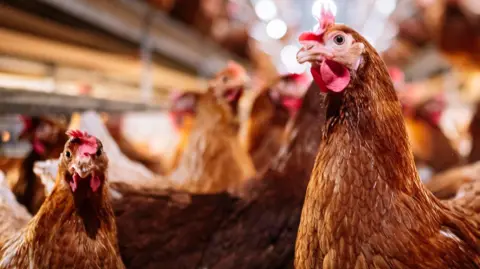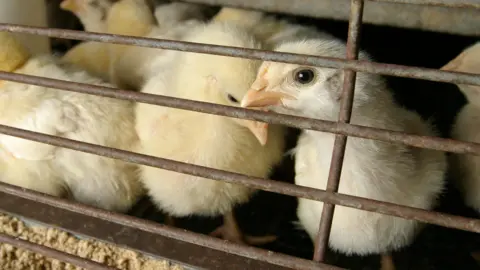Birds will be free to roam again as indoor-only measure to be lifted
 Getty Images
Getty ImagesA compulsory housing measure on poultry and captive birds in Northern Ireland will soon be lifted, the Department of Agriculture, Environment and Rural Affairs (Daera) has announced.
The measures, which were to keep all birds and poultry indoors to mitigate the potential spread of avian flu, will be lifted at 12:00 (BST) on Saturday 10 May.
The Republic of Ireland will also follow suit and lift the same measures on this date.
The move was part of the Avian Influenza Prevention Zone (AIPZ) in Northern Ireland, which was introduced on 18 January this year.
But gatherings of captive birds are still not permitted.
 PA Media
PA MediaDaera Minister Andrew Muir said the last confirmed case of avian flu in poultry was "in late February" and thanked poultry farmers who have suffered an "incursion of disease this year" for their "engagement and cooperation".
Muir added that even with measures relaxed the message "remains the same to all bird keepers...whether they have just a few birds or thousands...that they must continue to do their bit to maintain strict biosecurity measures on premises".
Thousands of birds were culled in Northern Ireland due to avian flu from the start of 2025.
Bird flu was confirmed at three commercial poultry premises and a captive bird collection in the Mid Ulster area.
 Reuters
ReutersNorthern Ireland's Chief Veterinary Officer Brian Doher said, "The risk of an AI incursion in Northern Ireland has been kept under close review by the Department."
He added that reviews and evidence have been considered to determine the "most appropriate time to reduce the current protective measures in place".
A ban on gatherings will remain in place on birds including galliforme (including pheasants, partridge, quail, chickens, turkey and guinea fowl), anseriforme (including ducks, geese and swans) and poultry.
This measure is part of the Avian Influenza Prevention Zone (AIPZ) which places a legal requirement on all bird keepers in Northern Ireland to follow strict biosecurity measures.
A biosecurity checklist is available on the Daera website.
